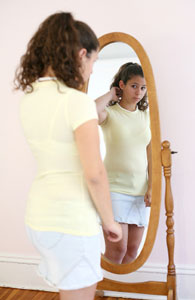Constantly bombarded by images of super skinny, size 0 models and movie stars such as Mary-Kate Olsen, teenage girls are sent overwhelming messages to be skinnier, smaller, and even tinier than ever. One tool that many young girls are turning to is the use of diet pills, such as hoodia and Hydroxycut.
A 2006 University of Minnesota found that more than 20% of 19-year-old girls confess to using diet pills. “These numbers are startling, and they tell us we need to do a better job of helping our daughters feel better about themselves and avoid unhealthy weight control behaviors,” University of Minnesota professor and study researcher Dianne Neumark-Sztainer said. (Neumark-Sztainer is also the author of the popular book, “I’m, Like, So Fat!“.)
Diet pills are ineffective and in many cases, extremely dangerous, even to the point of being linked to death in users. The study also found that more than 62% of teenage girls use unhealthy weight control behaviors, including the use of diet pills, laxatives, vomiting or skipping meals to control their weight. The study found that teenage males had rates that were less than half of the females. So, clearly, there is a problem facing our girls.
What can we do to help our daughters avoid these unhealthy actions?
- Starting in childhood, help your child to develop a good exercise habit. Developing a love for activity can help your daughter learn to appreciate her body for the strength needed to boot a soccer ball, run a mile or field a hockey puck. Help your daughter engage in a healthy physical activity, one that she can continue during her teenage years.
- Avoid negative self talk, especially in the presence of your children. “I’m so fat, I hate my body, my thighs are huge!” – children listen to those things and mimic. Obviously, demonstrate healthy choices yourself – eat well, exercise, and avoid binging/skipping meals/taking diet pills yourself.
- Watch less television. Those who watch more TV have higher weights and less healthy diets. Instead, use that time to play games with your kids – maybe a family Wii competition!
- Keep the lines of communication open. Allow your child the freedom to talk about her weight concerns, but be ready to illustrate your examples of healthy body types. Periodically, ask if your child is engaging in those unhealthy weight loss activities, and be open to the questions that your daughter may ask. Be willing to listen to her concerns about her changing body. Talk, talk, talk about different body types and show your daughters that bodies come in all shapes and sizes. Talk about how bodies change as they go through puberty and why those changes happen. For example, hips widen to facilitate easier childbirth in adulthood and bones become stronger and more dense, which adds to weight. Reinforce that adult female bodies are much different than adult male bodies for a reason.
- Help your children get involved in making healthy food choices. Talk about the protein/carb needs of a body, what is needed for proper muscle growth and if your child plays a sport, emphasize the foods that will help with speed, endurance and achieving sports goals.
